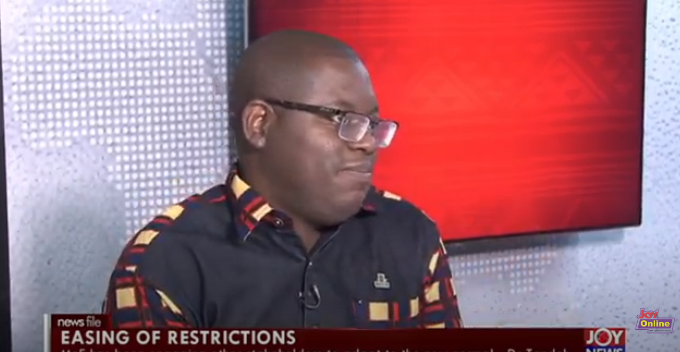The Vice President of IMANI Africa has called on the Ghana Education Service (GES) to publish documents based on which it is reopening schools.
Bright Simmons also wants government to provide data on which the containment of transmission is being executed.
According to him, government has only been paying lip service to the general public concerning the discussion surrounding the reopening of schools but is yet to publish any written document to prove its claims.
This, he told Samson Lardy Anyenini on Newsfile Saturday, defeats the purpose of accountability and transparency in governance and policy making.
“I think the nature of accountability in political office is that you go out of your way to assure people that you’re doing so by providing transparency. So if indeed you’re working on models, publish them.
“Put them out, let the people read them. I have been doing political analysis in this country for 15 years…and I’ve seen governments come and go. And the one thing that the Ghanaian governments refuse to accept is that you need to be pinned down to commitments in writing.
“This thing that we do government by oral culture worries all of us because it becomes very difficult to pin them to specific commitments. If you say you have modules on how you’re going to contain transmissions in school, publish them.”
Bright Simmons stated that per comparative matrixes on how schools are reopening carried out by Brooklyn’s Learning Policy Institute and a number of other organisations, it reveals that Ghana tends to be on the cutting edge.
This he says may not necessarily be a bad thing, “it just shows that we have a bit more appetite for risk and if it’s informed risk that is reasonable.”
His main concern, he told the host is that whereas other countries who are easing restrictions have published extensive and comprehensive information on their models, Ghana has not. And that creates doubt about the effectiveness of Ghana’s school reopening model.
“The challenge that I have is that when I look at these other countries , South Korea, Taiwan, the UK, Denmark, etc, I have done a literature review, I have extensive bodies of evidence about exactly how particular decisions are taken to the exclusion of other decisions.
“So, for instance, the so-called Gold standard which is the alternating streams model has now been fairly validated the most robust though obviously you’d have to collect more data. But the assumption is that given the behaviour of the diseases gestation period etc two weeks alternating tends to be such that if there are symptoms, you’re likely to catch enough of it in the house before they come back in and infect.
“We are doing continuous streaming so there is no alternating. If they go in six weeks it’s six weeks throughout. Well you can have an argument about that, but I would like to see some published work which says that ‘look, we looked at evidence in terms of the disease’s behavior in Ghana and we are quite fine with the continuous stream, we don’t want to do alternating because actually when we look at our situation in Ghana we think that will exacerbate the problem.”
He therefore called on the government and the GES to prove their claims by publishing the analysis and reasoning upon which the school’s reopening was based.
President Akufo-Addo earlier announced the reopening of schools for final year students at all levels of education on Monday, June 15, 2020.
He said after an engagement with the various teacher unions, government has decided to allow final-year students to go back to school to prepare for their final examinations.
In his 10th Address to the nation on measures taken by government to ease restrictions, President Akufo-Addo said all other levels of education will remain closed to students.
However, concerns have been raised by stakeholders about the safety of students who will be returning to school to prepare for their exit exams as well as that of teaching and non-teaching staff.
Deputy Director General of Quality and Access at GES, Dr Tandoh said enough safety protocols are being undertaken to ensure that transmission of the disease is contained and controlled, and the situation does not lead to an explosion of infections.
He said, schools will be provided with hand washing facilities, thermometer guns and an area for isolation will be designated should a student start showing symptoms.
He added that every student will be provided with three reusable face masks as well.
Latest Stories
-
Ghana ranked 7th globally as biggest beneficiary of World Bank funding
2 mins -
IMF board to disburse $360m to Ghana in December after third review
7 mins -
Former Bono Regional NPP organiser donates 13 motorbikes to 12 constituencies
13 mins -
Securities industry: Assets under management estimated at GH¢81.7bn in quarter 3, 2024
17 mins -
Gold Fields Ghana Foundation challenges graduates to maximise benefits of community apprenticeship programme
2 hours -
GBC accuses Deputy Information Minister Sylvester Tetteh of demolishing its bungalow illegally
2 hours -
Boost for education as government commissions 80 projects
2 hours -
NAPO commissions library to honour Atta-Mills’ memory
2 hours -
OmniBSIC Bank champions health and wellness with thriving community walk
2 hours -
Kora Wearables unveils Neo: The Ultimate Smartwatch for Ghana’s tech-savvy and health-conscious users
2 hours -
NDC supports Dampare’s ‘no guns at polling stations’ directive
3 hours -
Police officer interdicted after video of assault goes viral
3 hours -
KNUST’s Prof. Reginald Annan named first African recipient of World Cancer Research Fund
3 hours -
George Twum-Barimah-Adu pledges inclusive cabinet with Minority and Majority leaders
4 hours -
Labourer jailed 5 years for inflicting cutlass wounds on businessman
4 hours

